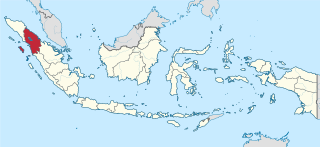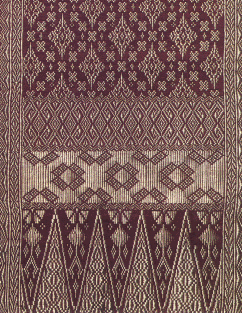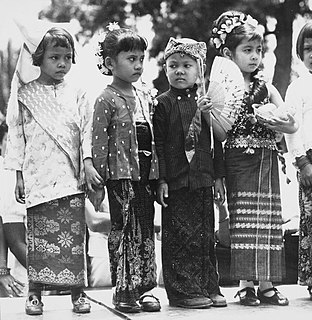Sakai is a city in Osaka Prefecture, Japan

North Sumatra is a province of Indonesia located on the northern part of the island of Sumatra. Its capital and largest city is Medan. North Sumatra is the fourth most-populous province after West Java, East Java and Central Java. The province covers an area of 72,981 km2. According to the 2020 population census, the province had a population of 14,799,361.

The culture of Indonesia has been shaped by long interaction between original indigenous customs and multiple foreign influences. Indonesia is centrally-located along ancient trading routes between the Far East, South Asia and the Middle East, resulting in many cultural practices being strongly influenced by a multitude of religions, including Buddhism, Christianity, Confucianism, Hinduism, and Islam, all strong in the major trading cities. The result is a complex cultural mixture very different from the original indigenous cultures.

The Batak are one of about 140 indigenous peoples of the Philippines. They are located in the northeastern portions of Palawan, a relatively large island in the southwest of the archipelago. Since ancient times, the Batak have inhabited a series of river valleys along the coastline of what is today Puerto Princesa City.

A kebaya is an upper garment traditionally worn by women in Southeast Asia, notably in Brunei, Indonesia, Malaysia, and Singapore. Outside of Southeast Asia, it is worn by Javanese, Malays and Portuguese Eurasians in Australian Cocos Islands and Christmas Island, coastal India and Sri Lanka, Macau as well as South Africa. The complete outfit is known as "sarong kebaya".

Songket is a fabric that belongs to the brocade family of textiles of the Malay world (today, Brunei, Indonesia, Malaysia and Singapore. It is hand-woven in silk or cotton, and intricately patterned with gold or silver threads. The metallic threads stand out against the background cloth to create a shimmering effect. In the weaving process the metallic threads are inserted in between the silk or cotton weft threads in a technique called supplementary weft weaving technique.

The Mandailing is a traditional cultural group in Southeast Asia. They are found mainly in the northern section of the island of Sumatra in Indonesia. They came under the influence of the Kaum Padri who ruled the Minangkabau of Tanah Datar. As a result, the Mandailing were influenced by Muslim culture and converted to Islam. There are also a group of Mandailing in Malaysia, especially in the states of Selangor and Perak. They are closely related to the Angkola.

The term Proto-Malay, which translates to Melayu Asli or Melayu Purba or Melayu Tua, refers to Austronesian speakers, possibly from mainland Asia, who moved to the Malay peninsula and Malay archipelago in a long series of migrations between 2500 and 1500 BC, and in one model the first of two migrations of early Malay speakers, before that of the Deutero-Malays. The Proto-Malays are the ancestors of the Malays in the modern Malaysia and Indonesia.
Batak Rabit is a small town in Hilir Perak district in Perak, Malaysia. The town is located near Teluk Intan town. It was named after Batak mercenaries that comes from the Batak District in Sumatra that was brought by Raja Laut during a Selangor civil war had their ears and noses grossly bangled that hung out.

Native Indonesians, also known as Pribumi, are Indonesians whose ancestral roots lie mainly in the archipelago, distinguished from Indonesians of known (partial) foreign descent, like Chinese Indonesians (Tionghoa), Arab Indonesians, Indian Indonesians and Indo-Europeans (Eurasians).

The concept of a Malay race was originally proposed by the German physician Johann Friedrich Blumenbach (1752–1840), and classified as a brown race. Malay is a loose term used in the late 19th century and early 20th century to describe the Austronesian peoples.

The national costume of Indonesia is the national costume that represents the Republic of Indonesia. It is derived from Indonesian culture and Indonesian traditional textile traditions. Today the most widely recognized Indonesian national costumes include batik and kebaya, although originally those costumes mainly belong within the island of Java and Bali, most prominently within Javanese, Sundanese and Balinese culture. Since Java has been the political and population center of Indonesia, folk costume from the island has become elevated into national status.

Batak cuisine is the cuisine and cooking traditions of Batak ethnic groups, predominantly found in Northern Sumatra region, Indonesia. Batak cuisine is part of Indonesian cuisine, and compared to other Sumatran cuisine traditions, it is more indigenously preserved. One characteristic of Batak cuisine is its preference to andaliman as the main spice. That is why andaliman in Indonesia sometimes dubbed as "Batak pepper".

A Kampung, Kampoeng, or Kampong is a village in Brunei, Indonesia, Malaysia and Singapore and a "port" in Cambodia. The term applies to traditional villages, especially of indigenous people, and has also been used to refer to urban slum areas and enclosed developments and neighbourhoods within towns and cities in Indonesia, Malaysia, Singapore, Cambodia, Sri Lanka and Christmas Island. The traditional kampung village designs and architecture have been targeted for reform by urbanists and modernists and have also been adapted by contemporary architects for various projects. Traditional kampungs are also a tourist attraction, such as Panglipuran village in Bali, Indonesia — awarded as one of the world's cleanest villages in 2016.











